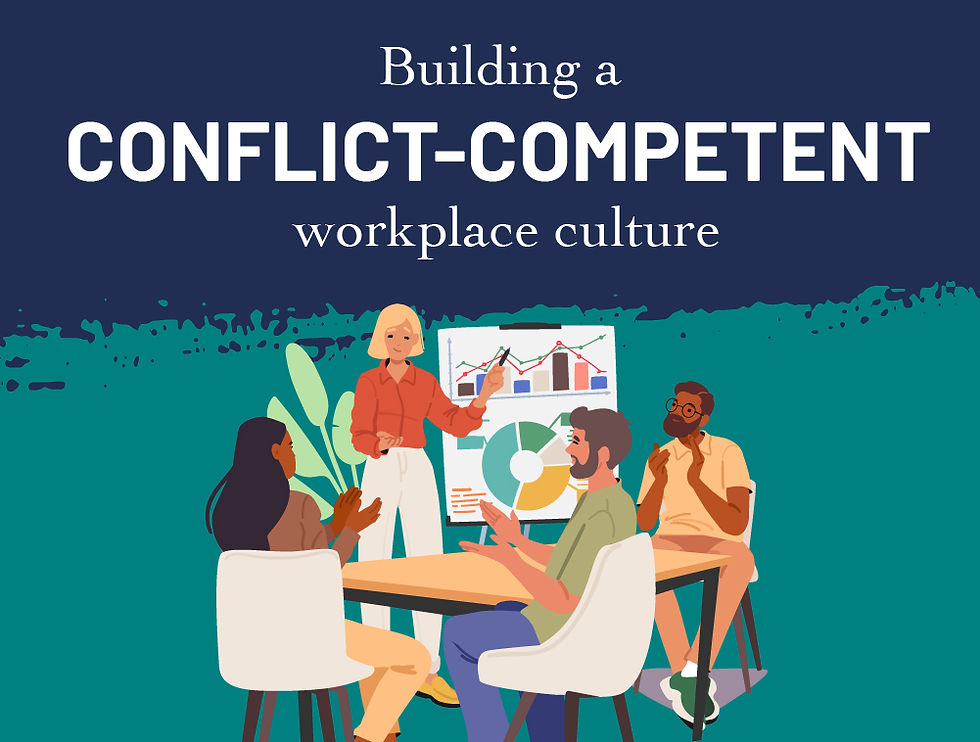Workplace Mediation: A Constructive Approach to Resolving Conflicts
- Dr. Robyn Short

- Aug 1, 2023
- 3 min read
Updated: Sep 10, 2025
Workplace mediation is a process in which a neutral third party helps disputing parties to reach a mutually acceptable solution.

In any workplace, conflicts are bound to arise as employees with diverse backgrounds, perspectives, and personalities collaborate towards common goals. However, workplace conflict is costly and allowing these disputes to escalate unchecked can significantly impact productivity, morale, and overall company culture. Workplace mediation is an effective and constructive approach to resolving workplace conflicts, fostering open communication, and creating a harmonious work environment. In this article, we will delve into the concept of workplace mediation, its benefits, the mediation process, and its role in building stronger and healthier organizations.
Understanding Workplace Mediation
Workplace mediation is a structured process in which a neutral third party, known as the mediator, helps disputing parties to reach a mutually acceptable resolution. Unlike traditional methods of conflict resolution, such as arbitration or litigation, mediation focuses on facilitating dialogue and understanding rather than imposing a decision from an external authority.
Benefits of Workplace Mediation
1. Preserving Relationships: Mediation emphasizes understanding and empathy, allowing the parties involved to maintain their relationships even after the conflict is resolved. This approach is particularly valuable in workplaces where ongoing collaboration is essential. 2. Cost-Effective: Compared to legal proceedings, workplace mediation is more cost-effective, saving the organization time and resources that would otherwise be expended in lengthy litigation. 3. Confidentiality: Mediation is conducted in a private and confidential setting, encouraging participants to openly discuss their concerns without fear of repercussions. 4. Empowerment: By participating in the mediation process, individuals feel empowered as they actively contribute to finding a resolution, rather than having one imposed upon them.
Workplace Mediation Process
1. Introduction: The mediator sets the stage by introducing the mediation process and establishing ground rules for respectful communication. 2. Opening Statements: Each party is given the opportunity to present their perspective, outlining the issues and concerns they wish to address. 3. Exploration and Understanding: The mediator facilitates a conversation where each party can express their emotions and thoughts, encouraging active listening and empathy. 4. Identifying Interests: The mediator assists in uncovering the underlying interests and needs of each party, exploring potential solutions beyond superficial positions. 5. Negotiation and Agreement: Together, the parties work towards finding common ground and crafting a mutually acceptable resolution. 6. Formalizing the Agreement: Once an agreement is reached, it is put into writing and signed by all parties involved, solidifying the commitment to the resolution. The Role of Workplace Mediation in Organizational Development 1. Enhancing Communication: Mediation fosters open dialogue, improving communication channels within the organization and minimizing the risk of future conflicts. 2. Strengthening Team Dynamics: Resolving conflicts through mediation can build trust among team members, strengthening collaboration and cohesiveness. 3. Employee Well-being: A conflict-free workplace promotes employee well-being, reducing stress and anxiety while increasing job satisfaction and overall morale. 4. Organizational Productivity: By addressing conflicts promptly, workplace mediation ensures minimal disruption to productivity, allowing employees to focus on their tasks and responsibilities. Workplace mediation is a powerful tool for organizations seeking to manage conflicts constructively, promote understanding, and build a more harmonious work environment. Emphasizing communication, empathy, and active resolution, mediation empowers employees to take ownership of their conflicts, leading to lasting and positive outcomes. As more organizations recognize the significance of workplace mediation, they pave the way for greater collaboration, higher employee satisfaction, and improved overall organizational success.
Workplace Peace Institute is an organization systems design and research firm that is singularly focused on creating workplace cultures where people thrive. Workplace Peace Institute supports small to mid-sized businesses in optimizing employee engagement, maximizing organizational productivity, and improving profitability by infusing human security and dignity as foundational attributes of their business model. Our Leadership Academy supports leaders in honoring basic human needs and dignity needs in the workplace, so they can actualize human potential in the workplace. The online Leadership Academy optimizes competencies in human behavior, communication skills, conflict resolution, and Diversity, Equity, Inclusion and Belonging to create highly engaged workplaces where basic human needs and dignity are consistently honored. All our courses are offered online and can be customized for in-person workshops and seminars.



